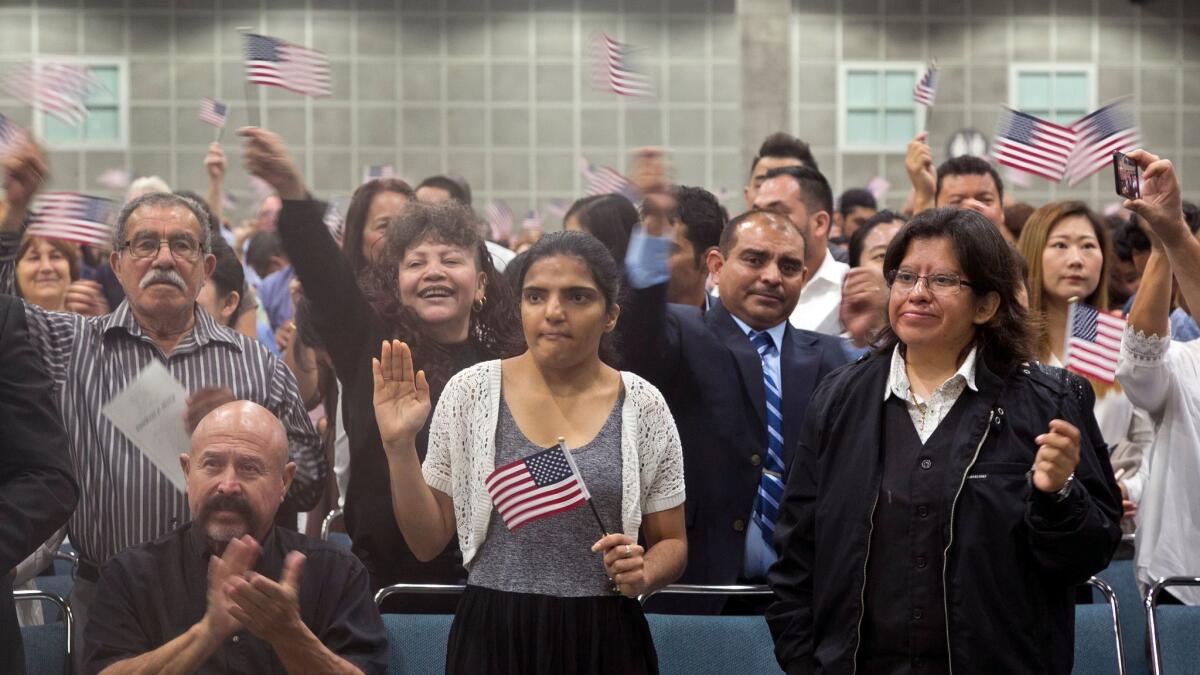Op-Ed: Becoming an American citizen in the age of Trump

- Share via
I felt my first real twinge of regret about not being a U.S. citizen in 2008, when Barack Obama was elected president.
Back in 1992, the American university where my father worked as a professor had helped secure green cards for my whole family. (I was 11 at the time.) I had renewed my green card twice since then. People often asked why I hadn’t applied for citizenship. This is the life I’m used to, I’d say: smugly returning jury notices, watching elections from a safe distance, standing in endless queues for travel visas, enduring taxation without representation.
The truth is I felt torn about swearing allegiance to a nation with such a horrific past — slavery, lynching, internment, Hiroshima, deportation, police brutality. But Obama seemed to transcend that history, to synthesize and neutralize it in his very body. He was born here, but, like me, he is mixed-race, black, Halfrican. I regretted not being able to vote for America’s first black president.
Then Donald Trump was elected president. For the first time in my life, I wanted to join a political protest, without fear of arrest and deportation. A week after he won the election, I put in my application for naturalization. A week after his inauguration, I had my biometric screening. A month after his second Muslim travel ban went into effect, I had my naturalization interview.
We clapped and waved little flags and laughed uproariously when a speaker joked that we would never again have to wait in an immigration line.
Over the last nine months, because of Trump’s presidency, I have learned more about American politics and history than I ever learned in high school, far more than I needed to know for my 10-question citizenship exam. I know all about filibustering and gerrymandering. I know what budget reconciliation is. I know when those Confederate monuments were built and why. I know that everyone in the U.S., regardless of immigration status, has the right to free speech — including the right to burn the American flag — and the right to bear arms. I know there is no official language of the U.S. I know what the 25th Amendment is.
My citizenship ceremony took place in Oakland in mid-August, mere days after the white supremacist rally in Charlottesville, Va. It was held in the historic Paramount Theater, which was big enough to hold more than 1,000 newly minted citizens from more than 90 different countries, plus their cheering friends and families. The neo-Nazis in Charlottesville had hollered, “You will not replace us!” Some of them had even subbed in “Jews” for “you.” As I looked around the packed theater, I thought, “Well, actually…”
We, the new people of the United States of America, gave oaths in unison and sang “The Star-Spangled Banner.” We stood up to represent our old countries as their names were read aloud. (Zambia was last on the list; I was the only Zambian.) We clapped and waved little flags and laughed uproariously when a speaker joked that we would never again have to wait in an immigration line.
The line to submit our passport applications stretched out of the theater and into the street. As it inched along, I registered to vote and spent the rest of the hour chatting with a lovely Nigerian woman about the traumas of the past months, about our lives in America, about the citizenship application process. We each took pictures with a cardboard cutout of Obama dressed as a superhero. (Bless you, Oakland.)
I was hoping to receive an accidental letter of welcome from him rather than Trump, as hundreds of other newly naturalized citizens had. But when we received our precious envelopes in Oakland that day, there was no letter of welcome at all. Trump apparently hadn’t gotten around to writing and signing one. This feels especially fitting now that Trump has announced his intention to end the Deferred Action for Childhood Arrivals program, known as DACA. He has left the so-called Dreamers — children of immigrants, just like me — in torturous suspense.
California Supreme Court Justice Mariano-Florentino Cuéllar, also a naturalized citizen, gave the final speech at my naturalization ceremony. He exhorted us to believe that we belong here, that we are welcome. He told us that no one can tell us otherwise, “no matter how rich or poor they are, no matter which house they live in.” Then he paused. In that pause, the word “house” seemed to grow a capital letter and acquire the word “White” before it.
Still, I have chosen to become a U.S. citizen. I feel proud to be a U.S. citizen at a time like this. And I feel ashamed to be a U.S. citizen at a time like this. This ambivalence, I have come to realize, is the most American thing about me.
Namwali Serpell is a fiction writer and associate professor of English at UC Berkeley. Her short story “The Sack” won the 2015 Caine Prize for African Writing. Her first novel, “The Old Drift,” is forthcoming.
Follow the Opinion section on Twitter @latimesopinion or Facebook
More to Read
A cure for the common opinion
Get thought-provoking perspectives with our weekly newsletter.
You may occasionally receive promotional content from the Los Angeles Times.









